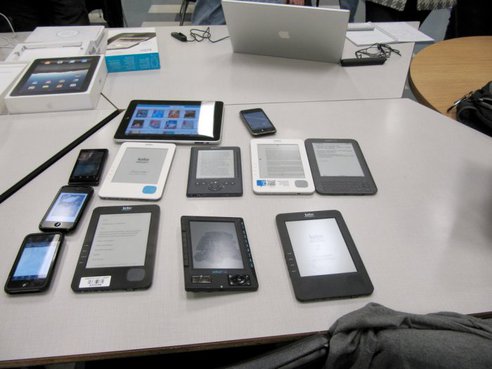As I put down my eBook reader to write this blog it has become apparent that we are seeing a dramatic change in the way we publicly share knowledge. I download eBooks from my library as well as from online eBook stores. But I don’t take out an eBook reader and return it after two weeks.
But in Bexar County, San Antonio, Texas, that’s the plan in the works – to open a library without physical books this fall. Called Biblio Tech, the library would be located in an under-served area of the county. Sounds strange but maybe not. Other U.S. cities have made similar attempts. In 2002, Tucson, Arizona opened a bookless library but five years later, because of customer requests, they added physical books. A 2011 proposal to build a similar facility in Newport Beach, California, ended when public outcry resulted in the project’s cancellation.
Publishing and books are changing. Of that there is no doubt. I recently wrote a blog on the evolution of textbooks in which I described how e-Textbooks because of the cost of academic publishing, represent a significant alteration in the way information of this type is provided. That’s because textbooks in post-secondary education can individually cost hundreds of dollars.
That may explain why San Antonio s home to an academic bookless library at the University of Texas which opened in 2010 and is winning accolades from students. The proposed public library, however, unlike its academic cousin will carry a limited number of titles all available to library visitors who will be able to check them out loaded on an eBook reader. Biblio Tech initially plans to have 100 eReaders available with 10,000 titles to choose from. eReaders can be checked out for two weeks and will time out and go dead if not returned. The Biblio Tech will also feature onsite computers, study areas and meeting rooms.
It will be interesting to see if bookless has staying power or like in Tucson, library members will eventually ask for physical books as well. As an avid user of my local library branch, I enjoy all of the resources that facility has which include computers, audiobooks, films on DVD, CDs, and thousands of physical books all organized and classified by subject area. And my library gives me the option of being able to go online and reserve books by author and title search when they are not available at my local branch. These then get delivered to the branch and I get notified by email, drive over and pick up my selection. I have even downloaded eBooks from the library to my Kobo eReader and my Samsung tablet. How much more convenient and accessible can a library be?
I just don’t see Biblio Tech as a long-term success. Certainly a novelty for the short term but checking out an eBook reader? How different is that from checking out a physical book?









